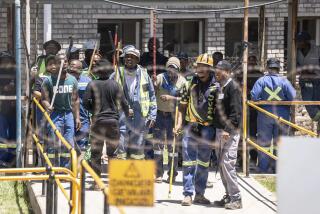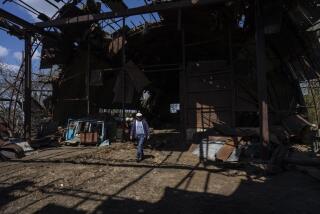Soviet Miners’ Strike Spreads to Ukraine
- Share via
MOSCOW — The strike by 110,000 Siberian coal miners for better living conditions and greater local autonomy spread Monday to the Soviet Union’s largest coal field, the Donets Basin in the Ukraine, as more workers rose to demand that the government honor the promises made by President Mikhail S. Gorbachev when he launched his reforms.
Eight mines were on strike in the Donets coal field, which has a history of labor activism, with demands similar to those of the strikers in western Siberia. Soviet state television reported that thousands of miners took part in a rally Monday at Makeyevka, the center of the new protest.
The miners’ demands, like those of the Siberian miners, focused on increased operating and financial autonomy for the Donets mines--measures that would allow them to raise the price of their coal, keep more of the profits and thus finance improved housing and ensure greater supplies of food and consumer goods and better community facilities.
Although adopted two years ago and central to Gorbachev’s reforms, the autonomy measures have remained largely unimplemented because of bureaucratic opposition and the difficulty of shifting the Soviet economy from state planning to reliance on market forces.
The Donets miners, 2,000 strikers from the first shifts of Monday who were joined later by others, are also demanding longer vacations, additional pay for night work and better pensions, according to the official news agency, Tass.
A television report from Makeyevka showed determined miners with coal-blackened faces, apparently just up from the pits, at a meeting where they demanded financial independence for their mines as the only way to meet their needs.
The eight-day-old miners’ strike in western Siberia’s Kuznets Basin, the country’s second-largest coal field after that in the Donets Basin, continued to grow Monday despite efforts of Communist Party and government officials to bring it to a quick end.
“All coal mine facilities are enveloped by the strike,” the government newspaper Izvestia reported, adding that huge strike rallies are taking place daily.
Nikolai N. Slyunkov, a member of the Communist Party’s ruling Politburo, led a delegation of party, government and trade union officials to the Kuznets mines in an effort to negotiate an end to the work stoppage, which now threatens hundreds of other industries in the region, in the Ural Mountains and beyond in European Russia.
Speaking to meetings of miners in several strike centers, Slyunkov promised that their grievances will be dealt with, but he urged them to return to work immediately for the sake of the country.
In Kemerovo, one of the Siberian strike centers, he warned the miners not to damage Gorbachev’s reform program, known as perestroika , or restructuring, by prolonging the strike. Major economic reforms were needed, particularly in management of the coal fields, he said, but they could be worked out only with steady production in all spheres of the economy.
Slyunkov later opened talks with strike leaders, managers of the mines and local political leaders in Prokopyevsk, another strike headquarters, in an effort to reach a compromise that would restore production quickly.
Gorbachev sent a personal appeal to the strikers Sunday to end the protest, Premier Nikolai I. Ryzhkov told the Supreme Soviet, the national legislature, in Moscow.
Ryzhkov told the lawmakers that the strike had been caused by an accumulation of problems due to “inertia of local authorities” and that he strongly opposed the use of any force in resolving the issue.
Viktor Y. Medikov, a member of Parliament from the region, told the Supreme Soviet that the situation there has grown “extremely serious,” with miners openly skeptical of the government’s promises to resolve their grievances.
More to Read
Sign up for Essential California
The most important California stories and recommendations in your inbox every morning.
You may occasionally receive promotional content from the Los Angeles Times.













